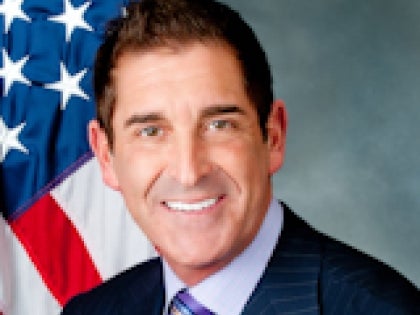
Klein Releases Report On Sub-prime Hall Of Shame
Jeffrey D. Klein
October 27, 2007
NEW YORK- Standing outside the New York Stock Exchange, Deputy Democratic Leader, Senator Jeff Klein (D-Bronx/Westchester) joined with Democratic Leader, Senator Malcolm Smith (D-Queens), Senator Diane Savino (Staten Island/Brooklyn), Senator Martin Connor (Manhattan/Brooklyn) and members of the Senate Democratic Conference to release the results of his most recent report on the sub-prime lending crisis which reveals the top ten originating lending institutions and foreclosing institutions with the highest rate of foreclosure in New York City and Westchester County. These are the banks which approved the precarious sub-prime loans which have left thousands of New Yorkers in financial straits, and the creditors which bought these loans and are now foreclosing on them. The report also identifies the average life-span of a sub-prime mortgage from the time it is approved to the foreclosing action according to borough.
Topping the list of originating lenders is Fremont Investment and Loan, which although it has withdrawn from the secondary sub-prime market and closed its residential mortgage division, continues to act as the foreclosing body on the loans it still services, which in certain cases makes it both the originating lender and the foreclosing bank. Trailing Fremont in short succession is WMC which is now for sale, New Century which is bankrupt, and Argent which has been sold to Citigroup.
The originator lender is the depository institution which offers the initial sub-prime mortgage and secures its approval. Once secured the originating lender will package the mortgages and their servicing rights and sell them to a commercial bank or Wall Street lender. It is these loan purchasers which end up as the creditors in the foreclosure filings.
The Senators’ call comes just days after Countrywide, one of the major offending institutions on the list, recently announced that it will refinance $16 billion worth of loans, mostly from the sub-prime market.
“These banks grew rich off of defrauding the American Dream, but it’s time for them to step up and follow Countrywide’s lead by taking responsibility for the real flesh and blood families who face foreclosure and pulling them back from the brink. Despite this egregious violation of the public trust, stock in Fremont and many banks like it, continues to be traded on the New York Stock Exchange. Yet these banks still have a responsibility to the people who put them there in the first place. The fact that we can not even stand outside of these faceless institutions is further indicative of the lack of recourse available to the 19,000 plus New Yorkers who stand to lose their homes,” said Senator Klein.
Although Fremont Bank suspended all residential sub prime lending in March 2007, per a FDIC cease and desist order, the wholesale origination of the sub-prime residential real estate mortgages were primarily sold to third party investors on either a servicing released, or retained basis, or securitized.
The report presents a snap-shot of the originating lenders in New York and Westchester by analyzing the top two problem areas in each borough and/or county previously identified by zip code in his August 2007 report. The top originating lenders in each area identified were responsible for 10-13% of total foreclosures in that zip code, therefore the data in the report represents a fraction of the total loans for which Fremont is responsible.
“If we look at the larger picture, Fremont would be responsible for approximately 1,500 mortgages set to be foreclosed in New York City alone.”
The Senator calculated this number based upon an application of the percentages to the total foreclosure filings for each borough in which Fremont was the major foreclosing body.
"As new waves of home foreclosures continue to unfold, we must be aggressive in arriving at a solution. Senator Klein's latest report on the frequency of foreclosures in New York State makes clear our refusal to treat this crisis as if it will simply go away, given time. We stand committed to putting this issue under the spotlight as we tour the state listening to stories from individuals victimized by predatory lending practices and continue urging the Senate to move forward with our legislation to bring borrowers much-needed relief," added State Senate Democratic Leader Malcolm A. Smith (D-St. Albans).
Senator Klein’s August report originally identified the top two neighborhoods in each borough with the highest rate of foreclosure. The October report goes one step further to reveal the top three loan originating lenders and creditors in each of these problem areas which are responsible for over 19,000 foreclosures in the Metro Area. From July 2006 through July 2007, there have been 14,561 foreclosure filings in NYC alone; and an additional 5,168 in Westchester and Nassau County. According to industry experts, New York State as a whole is on pace in 2007 to exceed the number of mortgage foreclosure filings in 2006 by a staggering 60%.
Klein’s report offers an in depth look not only at the originators, but at the average time from which a loan was approved until the home was foreclosed upon broken down by borough/county with Queens leading the way (11 months), followed by Brooklyn (13 months), The Bronx (14 months), Staten Island (18 months), Manhattan (18 months), and Westchester (14 months).
“We are in the midst of a mortgage meltdown, which has spread instability into every aspect of our nation's economy.Here in New York, by the end of this year, thousands of residents will be in foreclosure. It's time for the Senate Majority to stop wasting the people's time and actuallytake up legislationthat theDemocratic Conference introduced back in April, which addresses this issue," said Senator Savino.
"The large financial institutions that are foreclosing on sub-prime mortgages should initiate measures that allow families to keep their homes. It would be good business practice for them to restructure loans, salvage what they can from their loans and save neighborhoods from the downward spiral triggered by large numbers of foreclosures,” said Senator Connor.
Senator Klein and the Senate Democratic Conference have proposed a variety of legislative measure to curb mortgage lending abuses, particularly in higher cost sub-prime lending where borrowers tend to have lower credit scores and fewer financing options, so lending terms are less favorable to them and hidden costs are commonly encountered. The rise of riskier new lending products, with adjustable interest rates, no money down, balloon payments and even longer lending terms have made mortgage financing available to more individuals than ever before, often without any serious scrutiny of their ability to repay the loan.
Senator Klein has also introduced S6394, the “New York Sub-Prime Predatory Lending Prevention Act.” The measure would include additional consumer protections on sub-prime home mortgage loans, including a prohibition on loan flipping when there is no tangible benefit to the buyer and a requirement that the lender verify the borrower’s ability to repay the loan, as well as mandatory education/counseling for all sub-prime products. The most salient aspect of Senator Klein’s legislation would create a fiduciary duty between the mortgage broker and the borrower. As of now there is no federal or state legislation which requires the broker to act in the best financial interests of the borrower.
In order to truly aide the borrower, it is the banks’ duty and obligation to:
- Identify those borrowers whose sub-prime mortgages are scheduled to reset in the coming months and renegotiate the terms of their mortgages in order for them to avoid any future financial difficulty;
- Identify those borrowers who are already having financial difficulty due to the terms of their sub-prime mortgages and provide them with a financial workout that will allow them to avoid losing their home; and
- Waive all charges associated with refinancing a borrower’s home if they are seeking to refinance due to being placed in a sub-prime mortgage.



